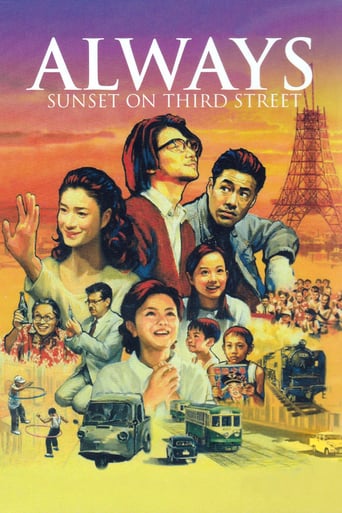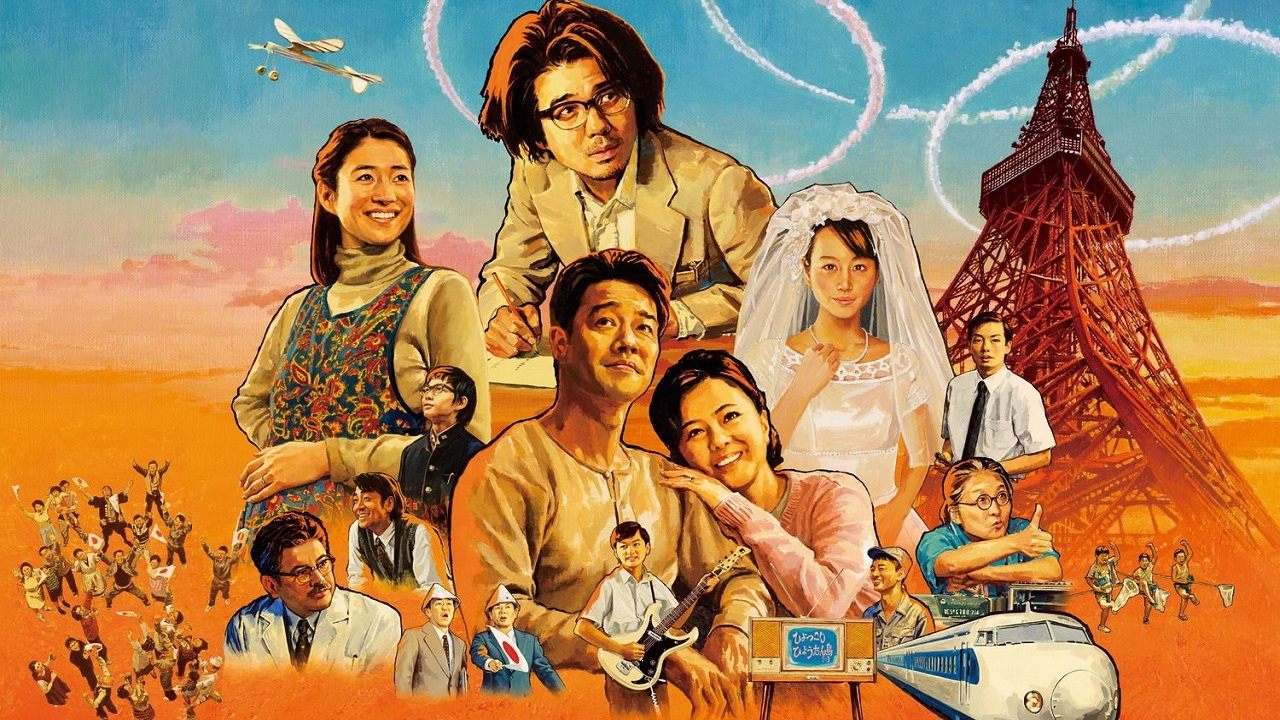TheStarWolf
Does a wonderful job of giving the viewer a look at what life in 1958 Tokyo was like. Likable characters, believable situations, and terrific recreation of a period neighbourhood.The atmosphere is spot-on as is the 'mood' of the people, and they must have raided every antiques shop, not to mention more than a few museums to produce several of the scenes. There's what has to be one of the most memorable scenes involving something which doesn't exist that I can recall. Won't say more for fear of spoiling it, but it worked beautifully in context.There's even mostly happy endings, though they do set up the possibility of a sequel and now that I know there is one, I'm very much looking forward to seeing it.
badidosh
While Takashi Yamazaki may be guilty of manipulation in wringing out the nostalgia-induced sentimentality off his viewers' hearts and eyes, it's not like those potential tears are totally undeserved in the oh-so romantic rendering of a bygone Tokyo. "Always - Sunset on Third Street," adapted from Ryohei Saigan's manga, has all the adornment of schmaltz as it follows a number of the Tokyo working class in 1958 as, following the war and backdropped by a being rebuilt Tokyo Tower, they steadily struggle through their lives to a better future. Yamazaki, though, roots his film in an innocent glorification of the community striving for a common goal as seen through warm sepia tones and golden hues.Among the multitude of the characters, Mutsuno Hoshino (Maki Horikita, who I just have to say remains as one of my favorite Japanese actors) is a recent junior high graduate who goes to Tokyo dreaming of a job at a prestigious automobile company only to find herself working as a repair woman in a car repair shop owned by Norifumi Suzuki (Shin'ichi Tsutsumi). Across the street is Ryunosuke Chagawa (Hidetaka Yoshioka), a candy shop owner struggling to make it as a serious novelist and makes up for his literary shortcomings by regularly submitting juvenile stories for a boys' magazine. Hiromi Ishizaki (Koyuki), a sake bar owner with a shady past, receives Junnosuke (Kenta Suka), a boy abandoned by his single mother, to be left in her care and, in turn, she leaves the boy to Ryunosuke.Taking place in a broadly idealistic and exaggeratedly whimsical parallel reality, Yamazaki may often succumb to contrived melodramatic trappings and a few missed comedic notes, yet his relentlessly effervescent tale possesses absorbing set pieces and a contagious joie de vivre none so more affectingly displayed by the film's closing shot. An unabashedly giddy fairy tale, "Always" is an ode and a love letter to the city's halcyon days as shared by its inhabitants who are slowly rising from its past and, slowly but surely, to the age of TV, refrigerator, and Coca-Cola.
jmaruyama
Who would have thought that director Yamazaki Takashi, the man behind such big sci-fi action films as "Returner" and "Juvenille" was capable of directing such a sweet and heart-touching movie about the importance of family, nostalgia and community.Set amidst the backdrop of the construction of the Tokyo Tower (1957-1958), "Always San Chome No Yuhi" (Always - Sunset On Third Street) follows a young high school student from the northern prefecture of Aomori, Hoshino Mutsuko (Horikita Maki) a recent Junior High graduate who is now off to Tokyo, having been accepted for employment at a "prestigious" Auto Company. However much to her chagrin and disappointment, Mutsuko discovers that the cozy job of her dreams is merely an apprentice mechanic's position with a small struggling auto repair store. It's owner, the proud and hot-tempered Suzuki Norifumi (Tsutsumi Shinichi) a former soldier and himself a country boy had come to Tokyo with dreams of setting up his own car factory. Norifumi is equally disappointed that his request for a first rate mechanic went wrong (Suzuki had misread Mutsuko's resume which stated that she had taken courses in bicycle "jitensha" repair and not car "jidousha" repair). Conflicts arise as Mutsuko struggles to learn the car repair business from Suzuki. Her only allies at home are Suzuki's kindly wife Tomoe (Yakushimaru Hiroko) and Suzuki's rascally young son Ippei (Koshimizu Kazuki).Across the way, struggling writer and neighbor Chagawa Ryunosuke is also having a battle with harsh reality. Despite graduating from acclaimed Tokyo University (Todai) with a literature degree, he still can't get descent work as a writer. To make ends meet he frequently submits sci-fi and adventure stories to a weekly "Shonen" (young boys) magazine even though he considers it trivial and unfulfilled work. He just barely makes ends meet through sales of kids toys and candy at his grandmother's store, which he inherited. His world suddenly changes when the local bar madam, Ishizaki Hiromi (Koyuki) a former dancer, asks him to take care of an associate's little boy, Junnosuke (Suga Kenta). Unable to say no to the beautiful madam, Ryunosuke takes in the shy and distant boy. As fate would have it Junnosuke turns out to be a big fan of Ryunosuke's "Shonen Magazine" work and a father-son bond slowly begins to form between the two. Even Hiromi soon begins to fall for the nebbish writer, after seeing how well he looks after Junnosuke.The screenplay by Yamazaki and Furusawa Ryota was adapted from Saigan Ryohei's Shogakukan/Big Comic Original manga (comic) series "Yuyake No Uta-San Chome No Yuhi" which told various nostalgic stories about different kids, teens and characters living in Tokyo of the 1950s and how they adapted to Japan's ever changing cultural, technological and social climate. While the movie does take much of it's inspiration from the manga, it also seems very much influenced by Robert Zemeckis's "Forrest Gump" particularly in the way it played with real historical events and characters in its story. "Always..." does something similar though somewhat eschewing some factual accounts.The character of Suzuki Norifumi is most certainly based on real life founder of "Suzuki Motors" Suzuki Michio, although his rise to fame is different. Ryunosuke Chagawa is most likely based on 1920's author Ryunosuke Akutagawa, the father of Japanese short stories and whose work Kurosawa Akira adapted in the film "Rashomon". While I'm not completely certain, the character of Furuyuki Junnosuke may also be an amalgam based on real life manga-ka (comic artist/writers) Matsumoto Leiji and Ishinomori Shoutaro. As other have mentioned, some of the performances bordered on the frantic and melodramatic particularly Yoshioka Hidetaka (Tora-San series, "Ame Agaru") as Chagawa and Tsutsumi Shinichi ("Lorelei", "Kyogokudo", "Drive") as Suzuki but it wasn't at all to the point of absurdity, just slightly forced. Yakushimaru Hiroko's role as atypical Japanese mother Suzuki Tomoe follows a long string of motherly roles shes played of late ("Ichi Liter No Namida", "Bubble E Go!" etc.) and is definitely in stark contrast to her Kadokawa idol days in movies such as "Sailor Fuku To Kikanjyu" and "Tantei Monogatari". Model-actress Koyuki ("Alive", "Last Samurai", "Kairo") is steadily becoming one of my favorite actresses as she always plays interesting characters. As the former dancer turned bar hostess Ishizaki Hiromi, she brings likable charm to the role. Her scenes with Yoshioka are heartfelt and you can't help but be touched by their offbeat but tender romance (similar to "Densha Otoko" in some ways).Special mention should be given to VFX Supervisor/Director Shibuya Kiyoko for the incredible CGI/miniature work that brought to life the world of 1958 Tokyo. From the architecture to the vehicles to the fashion, I was reminded of Peter Jackson's similar eye for detail for his remake of "King Kong" set in the 1930s. It was absolutely beautiful work and I kept asking myself how they were able to do it (they eventually released a separate DVD showing the production). Some of the humor and cultural references may be lost in translation by some, such as the mistakes regarding Mutsuko's name (Rokku-chan/Number 6) or the hype over wrestler Rikidozan or the nostalgia of riding the C62 train (before the Shinkansen took over). I kind of laughed at some of the cultural references and jokes that came up concerning House Curry, Coca-Cola, and the "Taiyozoku" (Sun Tribe).While some have called the movie a bit overly sentimental in its longings and nostalgia, I think that is what made the movie good. Like the classic Tora-San movies, it recalls a time when life in Japan wasn't so hectic, frantic and chaotic. It was a time where everyone in the various communities did really know each other and helped one another as good neighbors should. Even though I'm a child of the 1980s, I still appreciated this look to the past and didn't see it as an overly romantic point of view.
Ruairi McGovern
I saw this film on DVD a few days ago and thought it was very well made. While I agree with the fact that it's a too 'romantic' film version of Japan's economic recovery in the 1950's (paid for by the USA of course), it does have an excellent acting cast, great graphics and a good storyline. I'm thinking of course about the failed writer and the boy he takes in - they're so well played by the actors and beautifully so! It does mention the dark side of the economic miracle such as protistution and abandonment of children. No mention is made of the Americans based in Japan and of course the war is mentioned in parts. It does remind me of a film about France (I forgot the name...) in the 1950's and how things changed such as the introduction of freezers, TVS and of course the black stuff - Coca Cola! I'd still watch it, despite the criticism and I do enjoy a 'romantic' film. Besides the Americans have made over romantic films about the 1950's, so surely it's time Japan made one now!


 AD
AD



